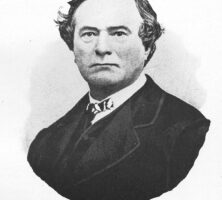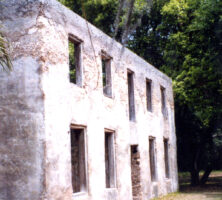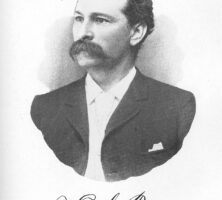The history of the first four generations of the DuBignon family in Georgia is interwoven with that of Jekyll Island, which the DuBignons owned from 1794 until 1886. During their nearly 100 years at Jekyll, these descendants of French emigrants emerged as prominent figures in the civic life of Glynn County.
Christophe Poulain DuBignon (1739-1825)
A French aristocrat, sea captain, and entrepreneur, Christophe Poulain DuBignon amassed a small fortune through trade and privateering. During the American Revolution, DuBignon harassed British shipping in the Indian Ocean, capturing a dozen ships. One of those prizes was valued at more than a million French pounds. He added to his fortune through commercial ventures in India.
His retirement in the late 1780s to his country estate in Brittany was short-lived because of the French Revolution. Fearing attack on his noble privileges, DuBignon traveled to Georgia in 1791 as a partner in the Sapelo Company. When the company collapsed, he exchanged his portion of Sapelo Island for land at Jekyll Island in 1794. By 1800 he owned all of Jekyll Island. He settled with his family at the Horton House, a tabby structure built as the home of Major William Horton in the 1740s.
DuBignon adapted to life as a cotton planter on Jekyll Island and prospered at times. But the profitability of cotton dropped sharply in DuBignon’s later years, owing in turn to President Thomas Jefferson’s embargo against the British, the Panic of 1819, and the devastating effects of hurricanes. In raids on Jekyll Island during the War of 1812 British troops plundered DuBignon’s plantation, but the greatest damage resulted from the British policy of slave liberation. In 1814, twenty-eight enslaved people—nearly half of the plantation’s enslaved labor force—left Jekyll with the British as freemen and women. To survive lean times, DuBignon used assets from France to finance his operations at Jekyll, making his plantation a truly transatlantic enterprise. In 1819, however, prospects were so discouraging that he put Jekyll Island up for sale. When no buyers came forward, the island remained under family ownership. DuBignon died at Jekyll in 1825 at age eighty-six.

Colonel Henry Charles Poulain DuBignon (1787-1866)
Because of his estrangement from his eldest son, Joseph (1785-1831), DuBignon bequeathed the majority of his estate to his son Henry. Henry DuBignon combined plantation management with civic duties, serving as commissioner of the city of Brunswick, Inferior Court judge, and trustee for Glynn Academy. Hismilitia service distinguished him most, and he carried the rank of colonel. Henry became the patriarch of the family, as it seems all descendants, both white and Black, trace their lineage to him. In two marriages and in extramarital affairs, he fathered no less than twenty children.
Henry moved to Brunswick after his second marriage in 1852, and Jekyll was no longer the center of family life. Many of his adult children also moved to the mainland to establish homes or careers. His sons Charles and Joseph, for example, left Jekyll Island to pursue opportunities in politics, serving as state legislators for Glynn County in the 1840s. Charles DuBignon gave up public life, it was said, being “too truthful and upright to excel as a politician.” His marriage to the wealthy heiress Ann Virginia Grantland in Milledgeville, however, established him as a prosperous and respected planter in Baldwin County. Joseph DuBignon’s promising start in the Georgia House of Representatives was cut short by his death at age thirty-six.
In 1863 Colonel Henry DuBignon divided the island among the three surviving sons of his first marriage —Charles, John Couper, and Henry Charles—and his one unmarried daughter, Eliza. Each son received roughly one-third of the property and Eliza a token of thirty acres. Although Charles relocated permanently to Milledgeville after his marriage, the other two brothers resided on Jekyll and managed the plantation until the hostilities of the Civil War forced evacuation of the island. The role of the DuBignons as members of the planter aristocracy ended with the war as Jekyll ceased to be a viable plantation. The death of Colonel DuBignon in 1866 brought a symbolic close to this era.

John Eugene DuBignon (1849-1930)
Ownership of Jekyll Island was again consolidated under John Eugene DuBignon. An entrepreneur engaged in banking, manufacturing, and shipping in Brunswick, John Eugene saw Jekyll’s potential as a private hunting preserve. He himself had no claim to the island because his father, Joseph DuBignon, died before Jekyll was divided among his uncles and aunt, so John Eugene bought up all four parcels of the island between 1879 and 1885. With his brother-in-law, Newton Finney, John Eugene organized a hunting club, and Finney used his contacts in New York to attract investors among the monied and social elite, such as J. P. Morgan, Joseph Pulitzer, and William K. Vanderbilt. In 1886 the island was sold to the Jekyll Island Club Corporation, and it passed out of the hands of the DuBignon family. John Eugene DuBignon was the only local member of the club, and his modest home on the island still stands among the more elegant “cottages” built by millionaires.











